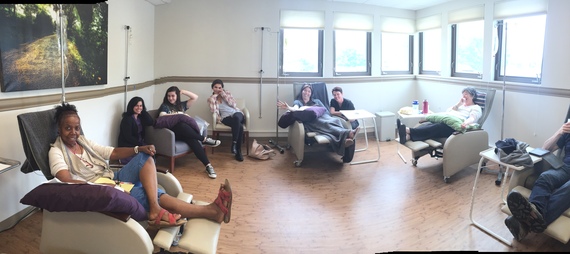Remember that moment in Who Wants to Be a Millionaire? when the contestant would get stumped, and opt to "phone a friend?" I always waited with bated breath, praying that the friend would know the answer; rejoicing when they got it right, and slumping in disappointment when they got it wrong. It was always such a poignant moment, hoping that the community the contestant had surrounded herself with was knowledgeable enough to help her win.
This idea isn't a new one; even children's groups embrace the idea of a "buddy" for swimming, hiking and field trips. Someone whose goal it is to support you, keep an eye out for you or help you grow. Get in shape for women (as well as other exercise facilities) has capitalized on this idea too, recognizing that we are intrinsically social beings who perform better when someone else is relying on us, and get motivated by looking good for others (even if we aren't yet ready to look good for ourselves!).
But nowhere is community more important than in your health. I know this seems counterintuitive, but left to your own devices, your chance of sustaining any particular diet or exercise program is extremely small. Take, for example, the statistics released by the University of Scranton which indicate that just eight percent of people actually achieve their New Year's resolutions each year.
The number one New Year's resolution is to "lose weight," followed by "get organized" then "spend less, save more." Given that obese individuals currently make up 35.7 percent of the population, and overweight individuals make up another 33 percent of the U.S. population, if we were able to... uh, tip the scale towards a higher percentage of individuals succeeding on their goals, then we would realize a significant cost savings from the avoidance of the diseases those individuals either never got, or got rid of.
But how do you get there from here?
At Visions HealthCare, we say that this is both simple, and quite complicated.
First, pick your number one health goal. Is it weight loss? Decreasing your blood pressure without the use of pills? Managing your anxiety or depression? Managing your chronic Lyme disease?
Second: Write down what it would look like in your daily life if you succeeded in this goal. How much weight, exactly, would you like to lose? What activities would you be able to participate in that you currently can't due to your health issue? How would you feel about yourself if you could accomplish this goal? What difference would you be able to make in the world that you currently cannot due to your restriction(s)? Take a moment and really imagine this new you.
Third: Establish a realistic timeline. If your goal is to lose 40 pounds, clearly that is not going to occur within 4 weeks! This is an important step. As humans, we like to push ourselves, set unrealistic goals, then punish ourselves for failing. Be realistic! You didn't gain 40 pounds in a month, losing it that quickly won't work either. And even if you did lose it that quickly, at that rate, it won't stay lost.
Fourth: This is the most critical step! Find at least one "someone" who is up to the same thing you are, or someone who holds you to account, and is willing to get in your face when you don't keep your word. Create a partnership with them; a win-win. Create the plan, speak and then write down your goals. If your goals relate to food, plan on speaking with your buddy every day, or three times a day if you need it! If it's movement-related, meet up with them every day, or speak at the beginning and end of the day to set out your daily goals and then complete whether you kept your word. Sometimes exercise plans that would otherwise have failed succeed when you add this accountability step.
Who would you be if you allowed others to contribute to you in this way? What could you accomplish? We at Visions HealthCare say it's always better in community. If you'll set up structures like these to support your health, you'll find that no matter where you're starting, you can get better -- and so will your whole community.
